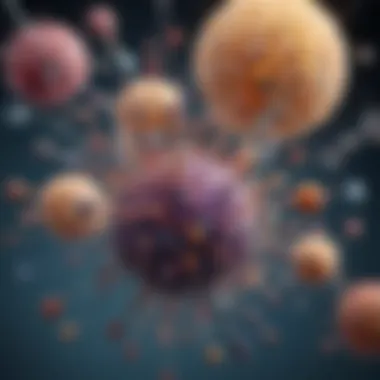Understanding Immunotherapy: Innovative Treatment Approaches


Intro
Immunotherapy represents a fundamental shift in the approach to treating various diseases, particularly cancer. Unlike traditional treatments such as chemotherapy and radiation, which directly target tumor cells, immunotherapy capitalizes on the body's own immune system to recognize and combat pathogens and abnormal cells. This innovative strategy has emerged over recent years as researchers have discovered ways to enhance immune responses through diverse methods, leading to promising and sometimes groundbreaking outcomes.
The significance of immunotherapy in modern medicine is profound. It does not only aim to kill cancer cells but also to establish a lasting defense against the disease. This ability to invoke a durable immune response has made it a focal point in oncological research and clinical applications.
As we explore the various dimensions of immunotherapy, it is essential to comprehend its mechanisms, explore ongoing research trends, and analyze its strengths and weaknesses. Engaging with this topic helps elucidate how recent advances could shape the future of healthcare and improve patient outcomes.
Research Overview
Summary of Key Findings
Recent studies underscore the diversity of immunotherapy approaches, which primarily encompass monoclonal antibodies, immune checkpoint inhibitors, and therapeutic vaccines. Monoclonal antibodies, such as Rituximab and Trastuzumab, target specific antigens on tumor cells, effectively flagging them for destruction by the immune system. Immune checkpoint inhibitors, like Nivolumab and Pembrolizumab, work by lifting the suppression caused by cancer cells on immune responses, therefore enhancing the body’s ability to attack tumors. Therapeutic vaccines aim to train the immune system to identify and eliminate cancer cells more efficiently.
Moreover, clinical trials have revealed important variations in efficacy across different cancer types, emphasizing the need for personalized approaches tailored to individual patient profiles and tumor characteristics.
Importance of the Research
The implications of these findings are significant for both clinical practice and ongoing research. Understanding the diverse mechanisms through which immunotherapy operates allows for more informed treatment decisions. Furthermore, the emphasis on personalized medicine could lead to better-tailored therapies and improved therapeutic success rates.
Research into immunotherapy continues to evolve, hinting at novel approaches such as CAR T-cell therapy and oncolytic viral therapies, which present exciting prospects in the battle against cancer. As scientists and clinicians collaborate to unravel the complexities of immune responses, the potential for further breakthroughs seems promising.
Methodology
Study Design
The research on immunotherapy is traditionally structured around both pre-clinical studies and well-designed clinical trials. Pre-clinical investigations often involve animal models to analyze the immune response to specific drugs or therapies. This phase is critical in establishing initial safety and efficacy before progressing to human trials.
Clinical trials are usually outlined in distinct phases. Phase I trials assess the safety of a treatment, Phase II trials evaluate its efficacy, and Phase III trials compare the new treatment to standard therapies in larger populations.
Data Collection Techniques
Data collection in immunotherapy research is multifaceted, employing both quantitative and qualitative techniques. Researchers utilize assays to measure immune responses, imaging techniques to track tumor progression, and tissue biopsies to assess cancer characteristics. Patient-reported outcomes also play a substantial role in gauging the quality of life during treatment.
Overview of Immunotherapy
Immunotherapy represents a paradigmatic shift in the treatment of various diseases, notably cancer. It is gaining prominence as a critical tool in modern medicine due to its ability to harness the body’s immune system to recognize and combat harmful cells more effectively. This section unravels the fundamental importance of immunotherapy, focusing on its definition, historical evolution, and its current relevance in therapeutic settings.
Definition and Scope
Immunotherapy can be defined as a treatment that utilises the immune system to fight diseases. This approach can involve stimulating the immune system to work harder or smarter to attack cancer cells, or introducing components such as man-made immune system proteins. The scope of immunotherapy has expanded substantially since its inception, now encompassing various modalities, including monoclonal antibodies, checkpoint inhibitors, cancer vaccines, and adoptive cell transfer therapies.
Immunotherapy is particularly attractive because it can be tailored to individual patient profiles, often leading to less toxicity compared to traditional therapies, such as chemotherapy. Patients can experience prolonged remissions and, in some instances, curative outcomes.
Brief History of Immunotherapy
The history of immunotherapy is rich and spans over a century. Initial discoveries can be traced back to the early 20th century when immunological principles were first applied in the fight against cancer. Notably, the discovery of the role of the immune system by scientists such as Paul Ehrlich and Emil von Behring laid the groundwork for future developments.
In the 1970s, the concept gained momentum with the introduction of interferons and interleukins, which are proteins that modulate immune responses. However, a transformative period occurred around the 2010s, marked by the advent of checkpoint inhibitors like Pembrolizumab. These therapies have since seen significant success in various cancers, leading to groundbreaking advances in cancer treatment.
This background illustrates that immunotherapy has evolved from an experimental idea to a mainstream treatment option, with ongoing research dedicated to refining these techniques further and expanding their applications beyond oncology.
"Immunotherapy is not just a tool; it is a revolution in our understanding of how to engage the immune system for therapeutic purposes" - Unknown.
Mechanisms of Action
Understanding the mechanisms of action of immunotherapy is crucial to comprehend how these therapies attack diseases, particularly cancer. Immunotherapy aims to enhance or alter the immune response to target tumors effectively. By diving deeper into this topic, we can explore its unique features, advantages, and various considerations that arise when employing these treatment modalities.
Immune System Fundamentals
The immune system is the body's defense network, protecting against pathogens and foreign substances. It comprises various components, including white blood cells, antibodies, and other biological processes. Two primary branches exist: the innate immune system, which responds quickly to threats, and the adaptive immune system, which develops tailored responses over time. Understanding these fundamentals allows for a better grasp of how immunotherapies are designed to harness the immune response.
The innate immune system acts as a first line of defense. It includes barriers like skin and mucous membranes along with various phagocytic cells such as macrophages and neutrophils. The adaptive immune system, in contrast, relies on lymphocytes, specifically T cells and B cells, which recognize specific antigens. This dual function is central to crafting effective immunotherapies.
Types of Immune Responses
Immune responses can be classified into several categories but typically fall under two main types: humoral and cell-mediated responses.
- Humoral responses: Mediated mainly by B cells, this response leads to the production of antibodies, which neutralize pathogens or mark them for destruction.
- Cell-mediated responses: Governed by T cells, these responses are crucial for eliminating infected or malignant cells. Cytotoxic T cells directly kill virus-infected or cancerous cells, while helper T cells support B cells and other immune cells.
Both responses are vital for effective immunotherapy, as different therapies focus on enhancing these specific pathways. The therapeutic approaches vary, targeting distinct components of the immune system dependent on the disease being treated.


How Immunotherapy Modifies Immune Responses
Immunotherapy works by modifying the immune response to increase its ability to recognize and attack cancer cells. This modification can be achieved through several strategies.
- Monoclonal antibodies can bind to specific targets on cancer cells, marking them for destruction by the immune system.
- Checkpoint inhibitors disable the proteins that restrain the immune response, thereby allowing T cells to attack more effectively.
- Cancer vaccines stimulate the immune system to recognize and attack tumors.
Through these approaches, immunotherapies can either enhance the immune response or provide it with new tools to identify and target malignant cells.
By understanding the mechanisms of action in immunotherapy, healthcare professionals can tailor treatments to maximize efficiency and patient outcomes.
Overall, the ongoing research and development in the field of immunotherapy continuously expand our knowledge and its implications for future cancer treatment.
Types of Immunotherapy
The classification of immunotherapy is crucial to understanding how different treatments leverage the immune system to address various diseases, particularly cancer. This section will introduce four prominent types of immunotherapy, each with unique mechanisms and applications. By comprehending these categories, one can appreciate the versatility and specificity that immunotherapy offers in modern medicine.
Monoclonal Antibodies
Monoclonal antibodies are engineered molecules designed to bind specifically to antigens present on the surface of cancer cells. They play a significant role in enhancing the immune response against tumors.
Mechanism: These antibodies work through various mechanisms, including:
- Direct targeting: They can block growth signals received by cancer cells, inhibiting their proliferation.
- Immune system recruitment: Monoclonal antibodies can recruit immune cells to attack the marked cancer cells.
- Delivery of toxins: Some monoclonal antibodies are conjugated with therapeutic agents that deliver toxic substances directly to the tumor cells, minimizing damage to surrounding tissues.
Several monoclonal antibody drugs like Rituximab and Trastuzumab have gained approval and are widely used in clinical settings, significantly improving patient outcomes.
Checkpoint Inhibitors
Checkpoint inhibitors have transformed cancer treatment by targeting the regulatory pathways of the immune system. They work by blocking proteins that suppress the immune response to cancer cells.
Mechanism: The primary checkpoints targeted include:
- CTLA-4: This protein downregulates immune activation, and its inhibition can enhance T-cell activity.
- PD-1/PD-L1: By blocking this pathway, checkpoint inhibitors can reactivate T-cells that have become exhausted in the tumor microenvironment.
Drugs such as Pembrolizumab and Nivolumab have become pivotal in treating various malignancies, particularly melanoma and lung cancer, showcasing the potential of this approach in enhancing overall survival rates.
Cancer Vaccines
Cancer vaccines are designed to elicit an immune response specifically against cancer cells. These vaccines stimulate the body to recognize and attack tumor-associated antigens, thus enhancing the immune system's ability to combat cancer.
Types of Cancer Vaccines:
- Preventive vaccines: These aim to prevent cancer by targeting viral infections that can lead to cancer, such as the HPV vaccine.
- Therapeutic vaccines: These are intended for individuals already diagnosed with cancer. They work by enhancing the immune system's knowledge of cancer antigens.
Examples like Sipuleucel-T have been utilized in prostate cancer treatment, indicating the promising trajectory of cancer vaccines in personalized medicine.
Adoptive Cell Transfer
Adoptive cell transfer involves the infusion of immune cells that have been modified or expanded outside the body to boost their ability to fight cancer. This method taps into the body’s natural immune system, enhancing its ability to target tumors effectively.
Process: Adoptive cell transfer follows a few critical steps:
- Collection: Immune cells, typically T-cells, are collected from the patient.
- Modification or Expansion: These cells can be genetically modified to express specific receptors that enhance their anti-cancer activity (e.g., CAR T-cell therapy).
- Infusion: The expanded or modified cells are then infused back into the patient, where they seek out and destroy cancerous cells.
This technique has shown remarkable results in hematologic malignancies, particularly leukemia and lymphomas, showcasing the innovative adaptations within immunotherapy.
Current Applications in Oncology
The intersection of immunotherapy and oncology has shown remarkable advancements in the treatment of various cancers. This section will explore how immunotherapies are applied in real-world settings, shedding light on their effectiveness and role in reshaping cancer treatment paradigms.
Treatment of Common Cancers
Immunotherapy has gained recognition for its potential to treat multiple forms of cancer, including melanoma, lung cancer, and lymphoma. Monoclonal antibodies, checkpoint inhibitors, and cancer vaccines are currently applied in clinical practices. These treatments work by enabling the immune system to identify and destroy cancer cells more effectively.
- Melanoma: Nivolumab and pembrolizumab have emerged as standard treatments, providing survival benefits that were not achievable with traditional therapies.
- Lung Cancer: Atezolizumab and nivolumab are used to target specific proteins in cancer cells, significantly extending survival rates compared to chemotherapy alone.
- Lymphoma: CAR T-cell therapy has shown great promise, especially in certain kinds of non-Hodgkin lymphoma, leading to remissions in cases previously deemed unmanageable.
The application of immunotherapy in these cancers marks a turning point, offering options where earlier treatments failed. It raises hope for patients facing dire prognoses and illustrates the shifting landscape of oncological care.
Role in Personalized Medicine
Personalized medicine uses a patient's unique characteristics to tailor treatment. Immunotherapy serves as a crucial component. The response to these therapies often varies based on individual genetics and tumor biology. Hence, understanding these factors is vital for optimizing treatment plans.
Some key aspects include:


- Biomarker Testing: Assessing tumor markers helps determine eligibility for specific immunotherapies.
- Genetic Profiling: Analyzing a tumor's DNA can indicate how well the immune response may function.
- Customized Treatments: Combination therapies are being developed to enhance efficacy based on individual responses.
This personalized approach not only maximizes therapeutic benefits but also minimizes potential side effects. It aligns with the growing trend in cancer care to tailor therapies based on specific patient profiles, ensuring more effective and targeted interventions.
Immunotherapy in oncology represents a significant advancement, merging cutting-edge research with clinical applications. As understanding of the immune system and cancer continues, we anticipate further innovations that will enhance treatment outcomes for patients around the globe.
Research Trends and Innovations
Research in immunotherapy represents a dynamic frontier in medical science. The examination of trends and innovations is crucial to understanding how immunotherapy evolves and reshapes cancer treatment. Continuous investment in research and clinical trials yields new insights and practices. This section delves into two significant aspects: recent clinical trials and emerging therapies.
Recent Clinical Trials
Recent clinical trials are central to validating and improving immunotherapy approaches. These trials assess efficacy, safety, and tolerability of new treatments. Each trial contributes valuable data.
Examples of promising studies include:
- Pembrolizumab for non-small cell lung cancer has shown significantly improved survival rates.
- CAR T-cell therapy trials have demonstrated remarkable responses in patients with leukemia.
The results influence treatment guidelines and practices. Ongoing trials also explore combination treatments. Combining immunotherapy with traditional chemotherapy could enhance outcomes. The landscape of cancer therapy is shifting. New results create hope and raise questions about existing standards of care.
Emerging Therapies
The realm of emerging therapies is rich with potential innovations. New approaches often build on prior discoveries. This development signals a transition from conventional methods to more targeted therapies. Some noteworthy emerging therapies include:
- Oncolytic virus therapy: This method utilizes genetically modified viruses to selectively infect and destroy cancer cells.
- Neoantigen vaccines: Tailored vaccines based on individual tumor-specific antigens show promise for personalized treatment.
Attention to the immune microenvironment is increasing. Understanding how the tumor interacts with immune cells is vital for effective therapies. Continuous exploration contributes not only to the knowledge base but also to the practical application in clinical settings.
"The quest for innovation in immunotherapy is only beginning. Future investigations may lead to individualized medicine that leverages the body’s immune system more effectively than ever before."
The evaluation of these trends reveals a thorough commitment to improving patient outcomes. Through careful research, significant strides are made. As the understanding of immune responses deepens, the potential for more successful applications in clinical oncology expands.
Benefits and Limitations
Understanding the benefits and limitations of immunotherapy is crucial for anyone involved in medicine or biomedical research. This section aims to dissect the positive aspects of immunotherapy, while also addressing its drawbacks. It is essential for professionals and students alike to grasp both sides of this innovative treatment method to make informed decisions.
Advantages of Immunotherapy
Immunotherapy has emerged as a transformative approach in oncology. The advantages are expansive and significant. Key benefits include:
- Targeting cancer cells: Immunotherapy specifically targets cancer cells without harming surrounding normal tissue. This precision is beneficial compared to traditional treatments like chemotherapy and radiation, which can damage healthy cells.
- Durable responses: Some patients have experienced long-lasting responses after immunotherapy treatment. Immunotherapy is capable of training the immune system to recognize and combat cancer cells beyond the duration of treatment.
- Personalized approach: Immunotherapy allows for personalized treatment regimens tailored to an individual’s tumor profile. For instance, CAR T-cell therapy is a prime example where patients’ own T-cells are modified to target their unique cancer.
- Potential for combinatory use: Immunotherapy can be combined with other treatment modalities like chemotherapy or radiation, enhancing overall treatment efficacy.
In summary, the advantages of immunotherapy illustrate its promise as a cornerstone in modern cancer treatment strategies. Treating patients at a cellular level opens avenues previously unexplored.
Drawbacks and Side Effects
While the advantages are compelling, drawbacks and side effects cannot be overlooked. A comprehensive understanding must include these elements to ensure a balanced view.
- Unpredictable responses: Not all patients react positively to immunotherapy. Some may have limited or no response, even after enduring the treatment.
- Immune-related adverse events: Immunotherapy can provoke an overactive immune response, leading to side effects affecting healthy organs. Common issues include skin rashes, colitis, and endocrine disorders.
- Cost Considerations: Immunotherapy can be expensive. Access to this treatment is often limited by economic barriers, particularly in under-resourced regions.
- Complexity of treatment regimens: The need for ongoing monitoring and follow-up can strain healthcare resources. Treatment pathways may also be complicated, necessitating advanced medical infrastructure.
The intersection of benefits and limitations highlights the intricate balance required in immunotherapy management.
Understanding these facets equips professionals with insights necessary for patient communication and treatment decision-making.
Ethical Considerations
The ethical considerations surrounding immunotherapy are significant and multi-faceted. As a developing field in modern medicine, the implications of using the immune system to combat diseases, particularly cancer, raise essential questions regarding patient rights, equitable access to treatments, and the broader societal impact of these therapies. Addressing these ethical aspects ensures that advances in immunotherapy not only focus on clinical efficacy but also uphold ethical standards that govern medical practice.
Patient Consent and Autonomy
Informed consent is paramount in healthcare, particularly in innovative treatments like immunotherapy. Patients must have a complete understanding of the proposed therapies, including potential risks and benefits. In the context of immunotherapy, where treatments can be highly experimental, clear communication is crucial. Patients need to know the nature of the therapy, how it works, and what they can expect.
- Patients should be educated about:
- The mechanisms behind immunotherapy and its mode of action.
- Possible side effects and uncertainties involved.
- Alternatives available for treating their condition.
Autonomy extends beyond simply providing information. It also involves respecting patients' healthcare decisions. Patients have the right to decline or withdraw from treatment at any time. This belief in patient autonomy reinforces trust between healthcare providers and patients, fostering an environment conducive to managing complex treatment decisions.
Equity in Access to Treatment
Another crucial ethical consideration is equitable access to immunotherapy. There is a growing concern that disparities in healthcare access might prevent some populations from benefiting from these advances. The question arises whether all patients, regardless of socioeconomic status, geographic location, or ethnicity, have equal opportunities to receive immunotherapy.


Various factors that influence access include:
- Cost of treatment: Some immunotherapies are expensive, and not all insurance plans cover these therapies.
- Availability of treatment centers: Access can be limited in rural or underserved regions.
- Awareness and education: Patients may not be informed about available immunotherapy options due to a lack of resources or outreach.
Ensuring that immunotherapy is accessible to all warrants a concerted effort from both healthcare organizations and policymakers. It is essential to create frameworks that can help bridge these gaps, promoting fair access and addressing ethical concerns surrounding equity.
"Access to healthcare is a fundamental human right. Ensuring everyone has a fair opportunity to benefit from treatments like immunotherapy is crucial for future progress in medicine."
Regulatory Landscape
The regulatory landscape surrounding immunotherapy is critical to its development, implementation, and accessibility. As immunotherapeutic agents continue to evolve, regulatory bodies play a pivotal role in ensuring that these treatments are both safe and effective. This section covers two prominent aspects of this landscape: the approval processes that govern the introduction of new therapies and the importance of post-marketing surveillance.
Approval Processes
Approval processes for immunotherapy typically involve several stages, including preclinical trials, clinical trials, and review by regulatory agencies such as the U.S. Food and Drug Administration (FDA) and the European Medicines Agency (EMA). These processes are designed to thoroughly evaluate the safety and efficacy of new treatments before they can be made available to the public.
- Preclinical Trials: Before any human testing begins, researchers conduct laboratory and animal studies to assess the immunotherapeutic agent's biological activity, potential side effects, and optimal dosing. This is an essential first step.
- Clinical Trials: After successful preclinical testing, the drug undergoes several phases of clinical trials:
- Regulatory Review: Upon completion of clinical trials, sponsors must submit a New Drug Application (NDA) or Biologics License Application (BLA) for review. Regulatory bodies review the submitted data and may request additional studies or information.
- Post-Approval Monitoring: Once a drug is approved, ongoing monitoring ensures long-term safety and effectiveness, identifying rare or long-term side effects that may not have emerged in earlier trials.
- Phase I focuses on safety and dosage.
- Phase II evaluates efficacy and side effects.
- Phase III confirms effectiveness, monitors side effects, and compares it with standard treatments. These trials can take years and require a significant investment.
Thus, regulatory processes are comprehensive, designed to minimize risks associated with new immunotherapy treatments. Understanding these stages helps stakeholders navigate the complexities involved in bringing innovative therapies to market.
Post-Marketing Surveillance
Post-marketing surveillance refers to the practice of monitoring the effects of a drug after it has been approved for public use. This is an essential component of the regulatory framework for immunotherapy, as it allows for ongoing assessment of a treatment's safety and efficacy in a larger, more diverse population.
- Safety Monitoring: This involves tracking adverse effects that may not have been evident during clinical trials. Data is collected from healthcare providers, patients, and ongoing studies to evaluate the broader impact of the treatment once it is administered widely.
- Efficacy Tracking: Post-marketing surveillance also assesses how well the drug performs in the general population compared to the controlled environment of clinical trials. This can help identify specific patient populations that benefit most from the therapy.
- Reporting Systems: Various systems, such as the FDA's Adverse Event Reporting System (FAERS) in the United States, allow healthcare professionals and patients to report side effects. This data is crucial for identifying safety signals and making necessary regulatory updates or warnings.
Post-marketing surveillance thus provides a mechanism for continuous learning and improvement, ensuring that immunotherapies maintain their safety and efficacy over time.
Regulatory frameworks evolve alongside scientific advancements in immunotherapy, contributing to improved patient outcomes and safety.
Future Directions
The future of immunotherapy holds great promise in revolutionizing how diseases, particularly cancer, are approached in medicine. This field is fast-evolving, and understanding the future directions in immunotherapy can shed light on significant advancements that may emerge. It is not just about current frameworks but about laying a foundation for improving patient outcomes and treatment efficacy. The development of novel therapies is critical, as it provides hope for patients who face challenging diagnoses. Furthermore, these advancements can lead to approaches that are more personalized and less invasive than traditional treatments.
Potential Breakthroughs
In recent years, researchers have identified potential breakthrough strategies that could enhance the efficacy of immunotherapy. One such area is the advancement of personalized cancer vaccines. These vaccines can stimulate the immune system to target specific cancer cells based on individual tumor characteristics. Clinical trials have shown promising results, prompting further exploration in this area.
Another exciting breakthrough involves the development of bispecific T-cell engagers. These therapeutic agents can simultaneously bind to a tumor cell and a T-cell, thus enhancing the immune response against cancer. They could provide effective treatment options for patients with difficult-to-treat cancers, marking a significant improvement in current immunotherapeutic approaches.
Moreover, the exploration of microbiome influences on immunotherapy holds potential. Understanding how gut microbes affect immune responses could lead to more effective treatments. There is a growing interest in the correlation between the microbiome and treatment outcomes, reinforcing the need for comprehensive studies.
Integration with Other Therapies
The integration of immunotherapy with other therapeutic modalities is poised to enhance treatment outcomes in numerous ways. Combining immunotherapy with traditional treatments, such as chemotherapy or radiation, has shown potential in overcoming some limits posed by single modality treatments. For example, the use of checkpoint inhibitors alongside chemotherapy has been effective in several clinical settings. This synergistic approach might enhance the overall effectiveness of the treatment regimen.
Furthermore, the combination of immunotherapy and targeted therapy may prove fruitful. Targeted therapies can address specific mutations within tumor cells, potentially making them more susceptible to immune attack when coupled with immunotherapy.
However, careful consideration is necessary to design clinical trials that can assess these combinations effectively. Researchers need to understand how these combinations interact at the biological level. This understanding could yield enhanced response rates and decreased risks of resistance.
Exploring innovative combinations can lead to impactful treatment strategies, making immunotherapy more robust against various cancers.
The future of immunotherapy is not only a reflection of isolated advancements but a broader strategic integration of multiple therapeutic modalities. This holistic approach could lead to more effective treatment strategies and ultimately improve survival rates for diverse patient populations.
Closure
The conclusion of this article highlights the transformative power and ongoing evolution of immunotherapy in modern medicine. It serves to synthesize the key elements discussed throughout the preceding sections, connecting the scientific principles with the practical implications for patients and healthcare systems.
A central point is the diversified approaches within immunotherapy that allow for tailored treatment options. Immunotherapy can target specific cancer types, offering a personalized treatment framework. This customization not only enhances efficacy but also minimizes adverse effects compared to traditional therapies like chemotherapy. Understanding the distinct mechanisms, such as monoclonal antibodies and checkpoint inhibitors, elucidates how targeted therapies engage the immune system to eradicate malignant cells.
The advantages, as outlined, include durable responses in patients, particularly those with advanced cancer, and the potential for long-term remission. However, the limitations—such as possible immune-related side effects and the need for ongoing research to better define patient selection—are equally important to consider.
Moreover, ethical concerns surrounding equity and patient consent necessitate continuing dialogue as the field progresses. All these aspects combined underline the complex nature of immunotherapy and its implications for future medical practice.
The conclusion underscores that immunotherapy is not just a fleeting trend, but a pivotal aspect of oncological therapy that reshapes how cancer will be treated moving forward.
Recap of Key Points
- Immunotherapy utilizes the body’s immune system to combat cancer, which is a departure from traditional treatments.
- Different types of immunotherapy include monoclonal antibodies, checkpoint inhibitors, cancer vaccines, and adoptive cell transfer.
- Significant benefits are seen in personalized medicine, while challenges persist, including side effects and treatment access.
- Ethical considerations highlight the importance of informed consent and equitable access to innovative treatments.
- The regulatory landscape informs the approval processes and surveillance necessary for new therapies.
Immunotherapy's Role in the Future of Medicine
Looking ahead, the role of immunotherapy in medicine could be profound. As ongoing research and clinical trials yield promising data, future breakthroughs may not only expand the understanding of cancer but also enhance treatment modalities, potentially leading to curative solutions for more cancer types.
Collaboration between immunotherapy and other treatment approaches, such as targeted therapies and radiation, will likely create more robust options for patients, improving outcomes significantly. Furthermore, increasing public and professional awareness about immunotherapy's potential will help bridge gaps in access, ensuring that innovations can benefit a broader patient population.
In summary, immunotherapy represents a significant frontier in the fight against cancer, with the potential to reignite hope for many patients. As the field continues to evolve, its implications will resonate throughout the broader healthcare landscape.



